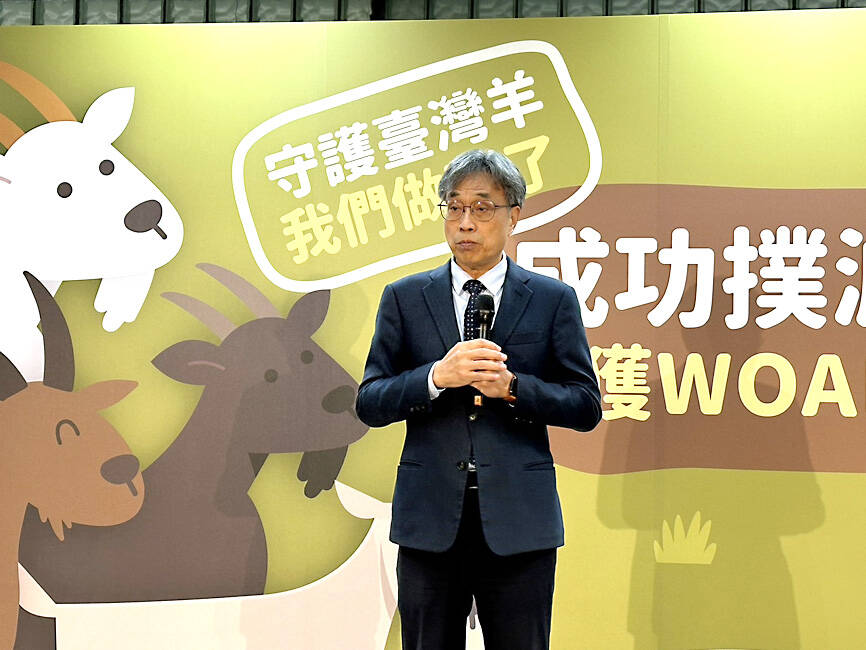The World Organisation for Animal Health (WOAH) has classified Taiwan as free of goat pox, the Ministry of Agriculture said on Thursday, adding that the status would greatly benefit the nation’s goat farming industry.
The WOAH status was made public on Tuesday, about three months after Taiwan applied for the change to be made, the ministry said in a press release.
Acting Minister of Agriculture Chen Junne-jih (陳駿季) said he welcomed the news with “great excitement,” adding that it was the result of a decade of effort by Taiwan’s authorities and farmers to eliminate goat pox, which was first detected in the nation in 2008.

Photo: Yang Yuan-ting, Taipei Times
The ministry would continue to help goat farmers upgrade their farms and equipment, for example by bringing in cold-chain logistics management and milk storage tanks, given that the industry has “huge potential for growth,” Chen said.
The objective is for Taiwan to establish itself as a robust producer capable of supplying goat products domestically, which would lower dependence on imports and reduce the nation’s carbon footprint, he said.
Official data showed that there are 33,002 dairy goats at 190 farms nationwide, with production worth approximately NT$401 million (US$12.85 million) annually — entirely for domestic consumption.
There are 83,494 meat goats at 1,462 farms, representing business worth NT$911 million annually, the data showed.
WOAH lists goat pox as a deadly viral disease caused by capripoxvirus. Live and inactivated vaccines are used to control the disease.
A region is considered free of goat pox when the disease has not been detected for at least three consecutive years, with the period starting six months after the slaughter of the last affected animal, the WOAH Web site says.
Animal and Plant Health Inspection Agency deputy director-general Hsu Jung-pin (徐榮彬) said that the first goat pox case was confirmed in Taoyuan in 2008, prompting the culling of 210 of the animals.
There was an outbreak two years later, leading to about 23,740 goats being culled, about one-quarter of the total number in Taiwan at that time.
Many goats were getting sick every day and there was “no way to stop” the spread of the virus until the vaccine became available, Goat Farmers’ Association director-general Lin Chun-chin (林浚琛) said of the situation in 2010.
Even though goat farmers were reimbursed for the culls, many were upset at having to kill animals that they had in some cases reared for more than a decade, Lin said.
However, the situation greatly improved after vaccinations began two months after the outbreak, Hsu said, adding that Taiwan’s last detected goat pox case was in Changhua County in February 2012.

Chinese Nationalist Party (KMT) Chairman Eric Chu (朱立倫), spokeswoman Yang Chih-yu (楊智伃) and Legislator Hsieh Lung-chieh (謝龍介) would be summoned by police for questioning for leading an illegal assembly on Thursday evening last week, Minister of the Interior Liu Shyh-fang (劉世芳) said today. The three KMT officials led an assembly outside the Taipei City Prosecutors’ Office, a restricted area where public assembly is not allowed, protesting the questioning of several KMT staff and searches of KMT headquarters and offices in a recall petition forgery case. Chu, Yang and Hsieh are all suspected of contravening the Assembly and Parade Act (集會遊行法) by holding

PRAISE: Japanese visitor Takashi Kubota said the Taiwanese temple architecture images showcased in the AI Art Gallery were the most impressive displays he saw Taiwan does not have an official pavilion at the World Expo in Osaka, Japan, because of its diplomatic predicament, but the government-backed Tech World pavilion is drawing interest with its unique recreations of works by Taiwanese artists. The pavilion features an artificial intelligence (AI)-based art gallery showcasing works of famous Taiwanese artists from the Japanese colonial period using innovative technologies. Among its main simulated displays are Eastern gouache paintings by Chen Chin (陳進), Lin Yu-shan (林玉山) and Kuo Hsueh-hu (郭雪湖), who were the three young Taiwanese painters selected for the East Asian Painting exhibition in 1927. Gouache is a water-based

Taiwan would welcome the return of Honduras as a diplomatic ally if its next president decides to make such a move, Minister of Foreign Affairs Lin Chia-lung (林佳龍) said yesterday. “Of course, we would welcome Honduras if they want to restore diplomatic ties with Taiwan after their elections,” Lin said at a meeting of the legislature’s Foreign Affairs and National Defense Committee, when asked to comment on statements made by two of the three Honduran presidential candidates during the presidential campaign in the Central American country. Taiwan is paying close attention to the region as a whole in the wake of a

OFF-TARGET: More than 30,000 participants were expected to take part in the Games next month, but only 6,550 foreign and 19,400 Taiwanese athletes have registered Taipei city councilors yesterday blasted the organizers of next month’s World Masters Games over sudden timetable and venue changes, which they said have caused thousands of participants to back out of the international sporting event, among other organizational issues. They also cited visa delays and political interference by China as reasons many foreign athletes are requesting refunds for the event, to be held from May 17 to 30. Jointly organized by the Taipei and New Taipei City governments, the games have been rocked by numerous controversies since preparations began in 2020. Taipei City Councilor Lin Yen-feng (林延鳳) said yesterday that new measures by